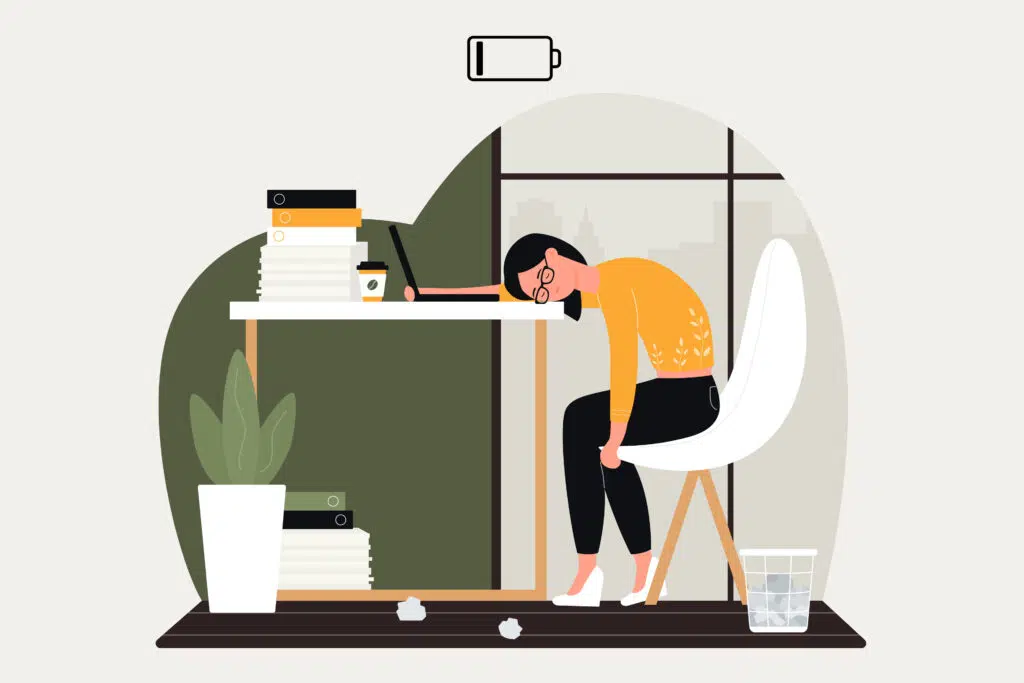What Does Anxiety Look Like In Teenagers?
Anxiety can be a complicated and overwhelming experience for teenagers and becoming increasingly common among young adults. Statistics suggest that anxiety disorders have risen in recent years, with many teenagers experiencing physical symptoms and emotional manifestations like fear, nervousness, and worry.

The rise of social media and being constantly connected in the digital age may contribute to increased anxiety among teenagers. After all, the pressure to curate and present a perfect online image and the constant comparison to others on social media can lead to feelings of inadequacy and low self-esteem.
Additionally, cultural shifts and changes make it difficult for teens to navigate their sense of self and identity, contributing to feelings of anxiety. For instance, the diversifying definition of gender and sexuality, as well as the discussions on racism and discrimination, play a significant role in mental health at any age. The wake of the COVID-19 pandemic has added to the stress and uncertainty of daily life, making it harder for teenagers to cope with their anxiety.
Teen Anxiety Facts And Statistics
It’s important to understand how widespread anxiety is in the world across different age groups. Anxiety is common among teenagers. Almost 1 in 3 teens between 13 and 18 will experience an anxiety disorder at some point. In addition, social anxiety disorder affects both men and women, usually starting at the beginning of the teen years and persisting for a decade or more.
Left untreated, anxiety can significantly impact a teenager’s life. Studies show that teens with anxiety who don’t get help are more likely to struggle in school, miss out on fun social activities, and even turn to substance abuse. In other words, the mental health condition can affect their whole life if it’s not addressed.
8 Signs Your Teenager May Have Anxiety
Anxiety in teenagers can manifest in different forms, making it more challenging to identify and solve. Here are some common signs that your teenager might be struggling with anxiety:
- Excessive And Constant Worry
This is one of the leading signs of anxiety in teenagers. If your teenager is constantly fretting about various things, it could indicate an underlying anxiety disorder. For example, they might worry and obsess about seemingly irrelevant things like a small mistake at school.
Even in their out-of-school life, your teenager might develop constant worries about issues that most people wouldn’t usually concern themselves with. This constant over-the-top worrying makes it more challenging for your teen to enjoy various activities, significantly interfering with their daily life, growth, and development.
- Sleep Issues
Sleep issues are another sign of anxiety in teenagers. Several studies note sleep complaints as one of the most common symptoms of youth anxiety reported by parents with affected teens. These young adults may have trouble falling asleep or staying asleep, leading to feelings of exhaustion and fatigue during the day.
In addition, your teenager may also experience nightmares or night sweats, which can further disrupt their sleep. As such, difficulty sleeping can make it harder for teens to manage their anxiety. This can lead to a vicious cycle of increased anxiety and poor sleep.
Therefore, you should seek professional help if you notice your child experiencing sleep problems.
- Withdrawal
Teens with anxiety may avoid social situations, such as hanging out with friends or attending school, out of fear or worry. In addition, your teenager may also avoid activities they once enjoyed, staying away from activities that they perceive as stressful. This withdrawal from society can make it harder for the young person to form and maintain relationships, leading to feelings of isolation and loneliness.
Importantly, teens withdrawing from society is not necessarily a choice but a symptom of an underlying condition. It’s crucial to keep an eye on your teenager, especially if they start to become withdrawn.
- Difficulties In School
If your teen is experiencing academic or disciplinary issues at school, it could point to anxiety. For instance, the child could have difficulties focusing in class or perform poorly due to test and performance anxiety. This can be compounded when your kid starts missing school to avoid such situations, leading to high truancy rates and further poor academic performance.
As a parent, you should understand that these issues might not necessarily stem from your child’s laziness or lack of interest in school. Therefore, if you notice your teenager struggling in school, it’s vital to talk to them about it and seek help. With the proper support and resources, teens can learn to manage their anxiety to excel academically and in other facets of their life.
In addition, addressing teenage anxiety extends further than school. Solving the problem also goes a long way in improving the quality of life through adulthood. While poor school performance doesn’t automatically point to anxiety, there could be a bigger reason why your child is struggling and they may need more support.
- Increased Irritability
If your teenager displays a heightened level of agitation or is frequently quick to snap, it may be a sign of struggling with anxiety. Irritability can manifest as physical symptoms such as restlessness, muscle tension, and fatigue. It can also present as emotional symptoms such as mood swings, anger, and frustration.
Therefore, it is essential to address irritability as it can significantly impact daily functioning and quality of life. Stepping in early on can help your teenager to learn how to process their emotions in a healthier way going forward. Everyone needs help now and again; seeking professional support can help many of us navigate through difficult life stages.
- Physical Symptoms of Anxiety
Anxiety can come out in both mental and physical symptoms. It can affect people differently. Keep an eye out for physical symptoms like:
- Stomach aches
- Palpitations
- Excessive sweating
- Dizziness and light-headedness
- Fatigue
- Headache
- Tension in the muscles
You should note that these signs and symptoms are also characteristics of other conditions. Therefore, finding adequate medical help to rule out other illnesses and disorders is crucial.
- Low Self-Esteem
Teens with anxiety may often have negative thoughts about themselves and their abilities, leading to feelings of inadequacy and low self-worth. This can manifest in various ways, such as avoiding social situations, not participating in activities they once enjoyed, or having difficulty making and maintaining friendships.
In addition, if your teenager has low self-esteem, they may also have difficulty setting boundaries. As a result, the child may be more likely to tolerate mistreatment from others.
- Panic And Anxiety Attacks
Anxiety and panic attacks can be a symptom of teenage anxiety. These attacks can be particularly intense and overwhelming, often out of the blue. Your teen might experience a racing heartbeat, sweating, shaking, and difficulty breathing during an anxiety attack. These symptoms can be so severe that they can cause teens to avoid certain situations or places because they fear another attack will happen.
It’s important to understand that while anxiety attacks can be scary and overwhelming, they’re not harmful and will pass. However, if left untreated, they can become more frequent and affect your child’s daily life.
Therefore, if your teenager is experiencing panic attacks, it’s essential to seek help. A therapist or counselor can work with them to understand the underlying causes of their anxiety and develop coping strategies to manage anxiety and panic attacks.
How Thriving Center Of Psych Can Help With Teen Anxiety
Because of the immediate and long-term dangers anxiety poses to teenagers, it’s important to seek out mental health professionals to solve the issue.
If you’re worried about your teenager, reach out to the caring team at Thriving Center of Psychology. We can match you with the right therapist to support your needs, understand how your teen feels, and start treatment.
Book an appointment online or in person at contact one of our offices in New York, California, Florida, New Jersey, Oregon, Minnesota, Illinois, Massachusetts, and Washington.

How to Build a Consistent Routine That Combats Depression
Depression can feel like a pit you can’t escape from, but know that depression is treatable with the right help. A basic daily ritual encourages healthy habits like a regular sleep schedule, healthy food choices, and exercise that support mental health.

How to Manage Stressful Life Transitions and Events
From getting into college or having a baby to splitting from a spouse or experiencing the death of a loved one, life can surprise you with big wins and tear you down with loss. Life is filled with transitions, some happy, others stressful and difficult.

How Long Does it Take to Recover from Burnout?
If you’ve reached burnout, it describes a state of complete emotional, physical, and mental exhaustion. Between heavy workloads, toxic work environments, economic uncertainty, and a poor work-life balance, burnout is a very real problem that can affect all aspects of your health.

What is Mindfulness Therapy?
Mindfulness therapy involves using mindfulness techniques to increase awareness and learn to manage emotions more effectively. These techniques include paying attention to the present moment without judgment.




